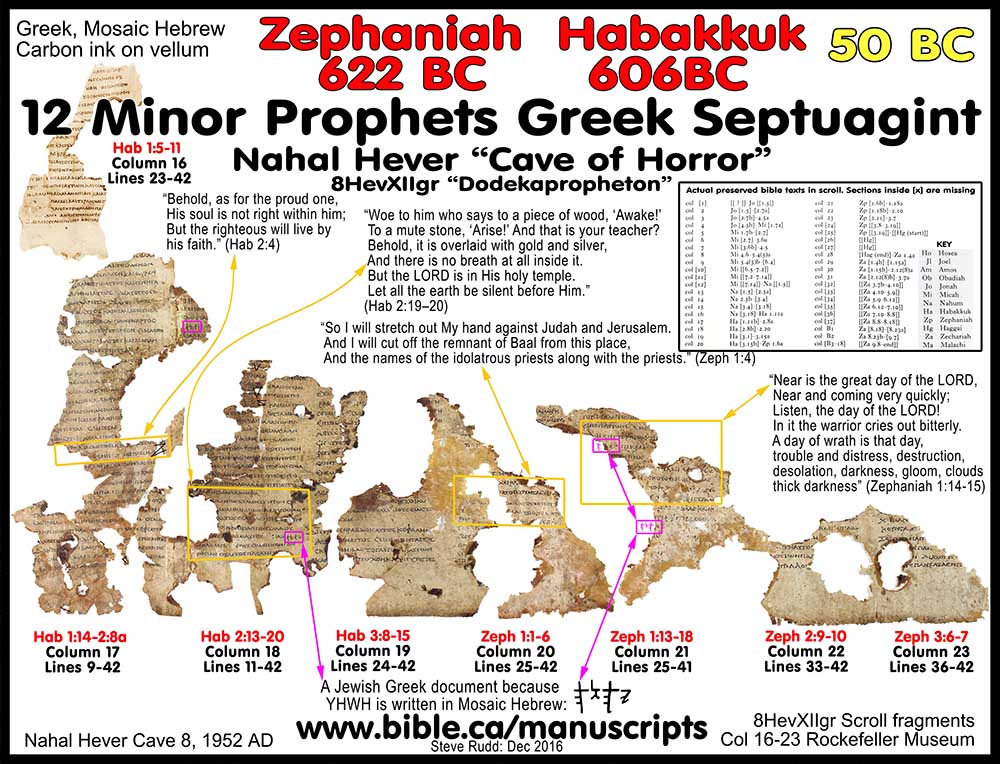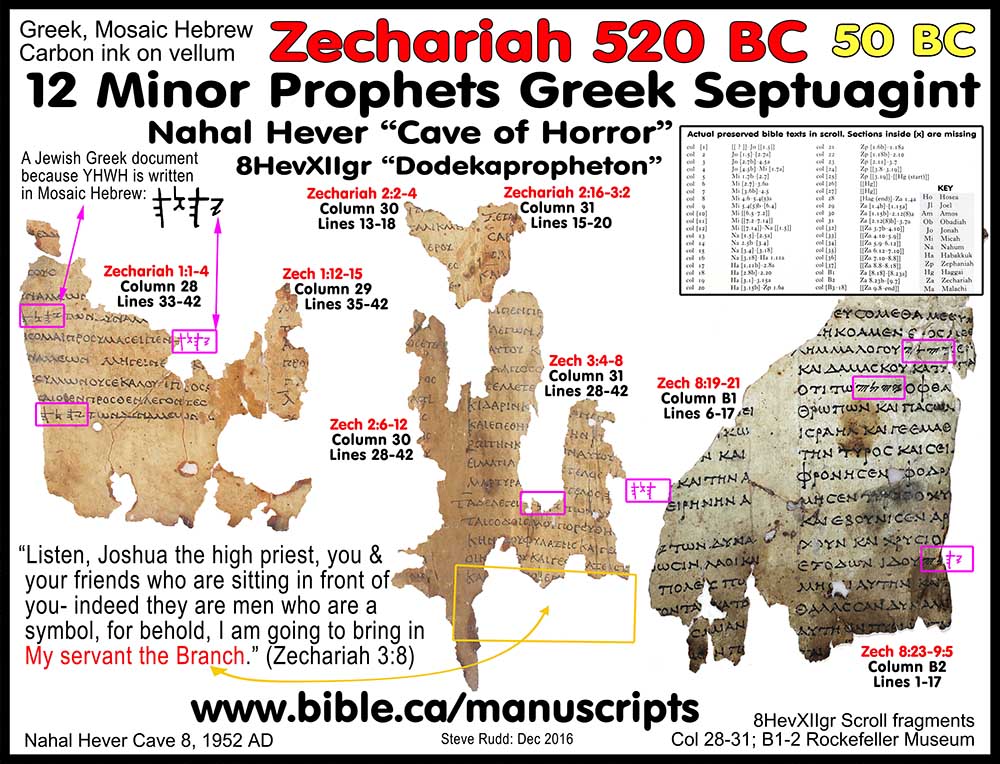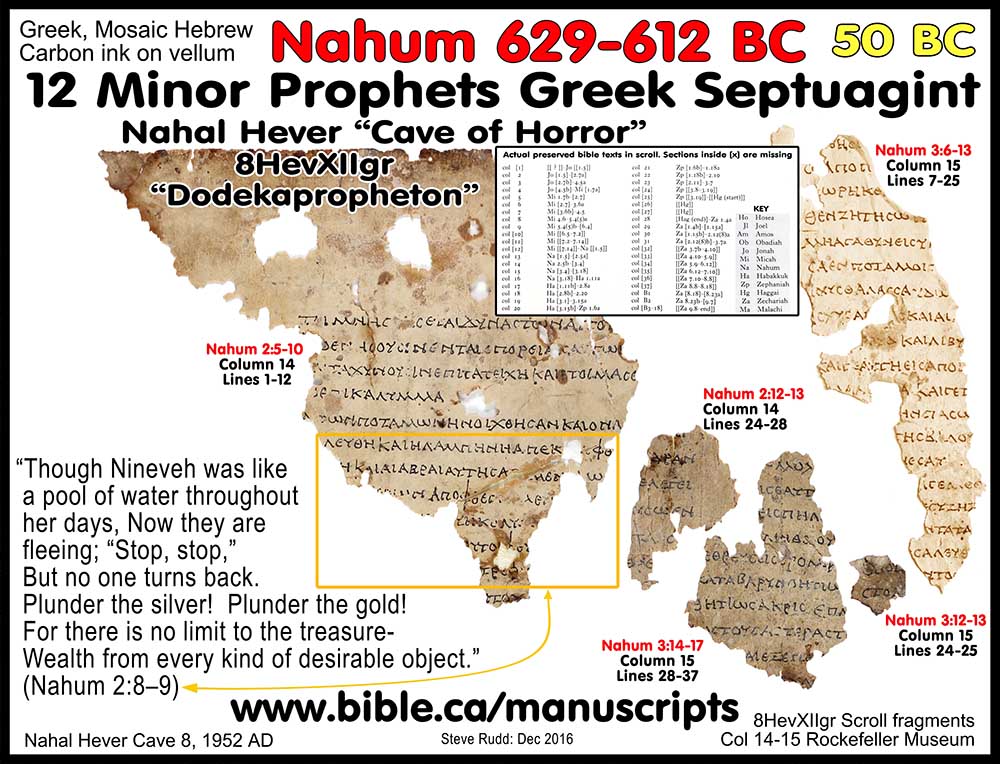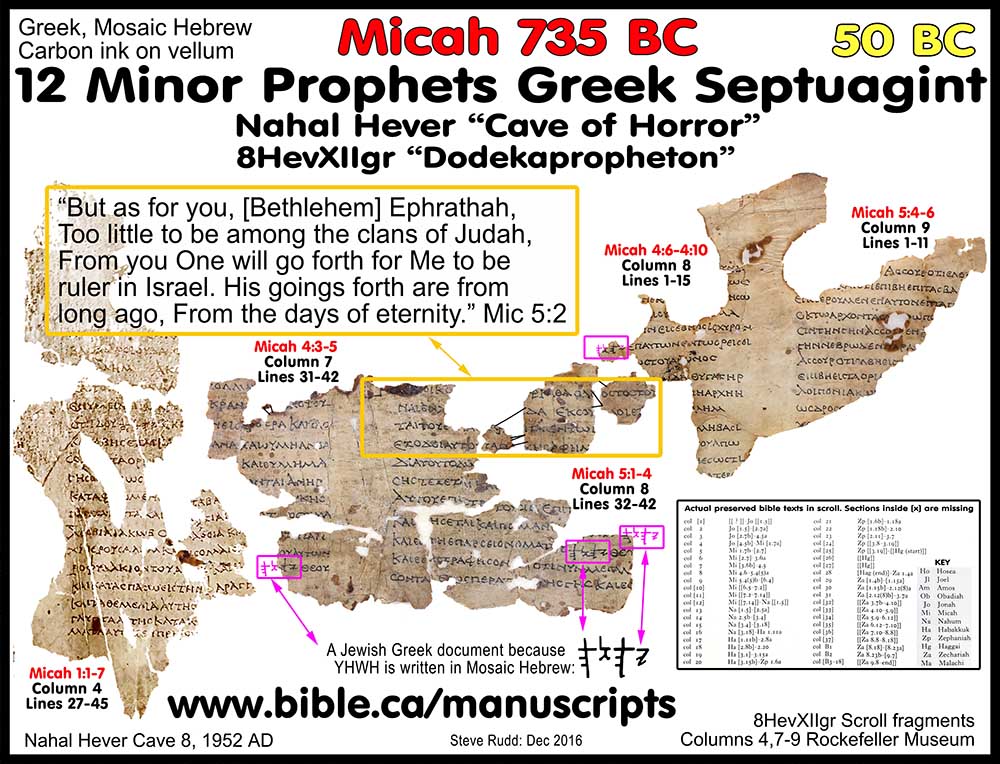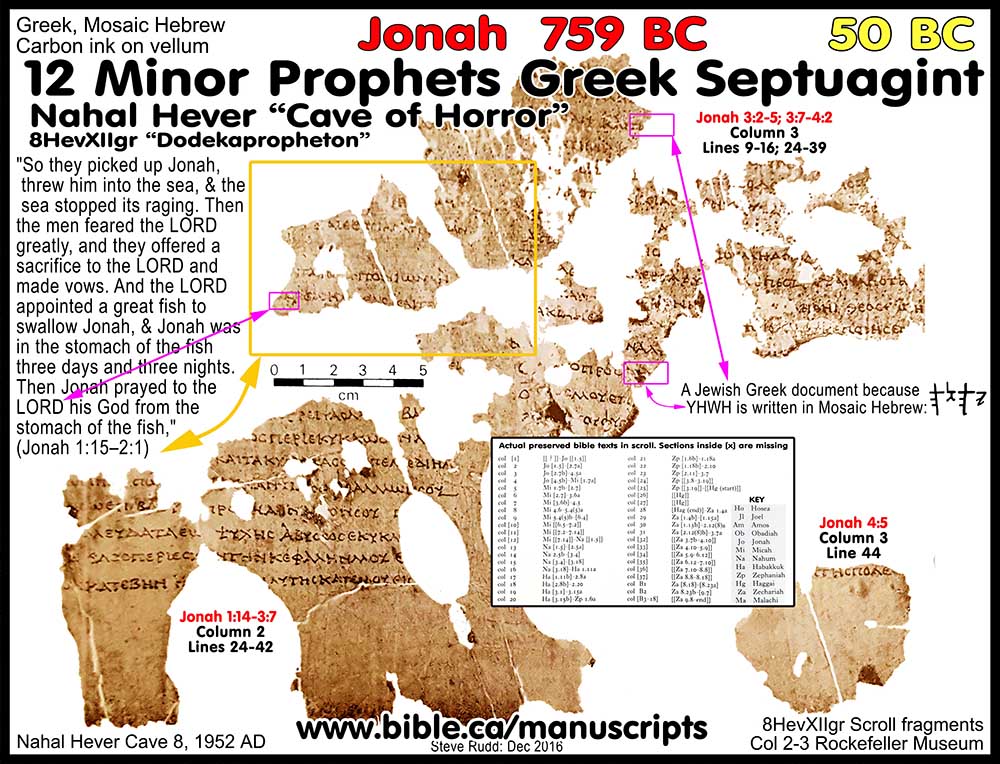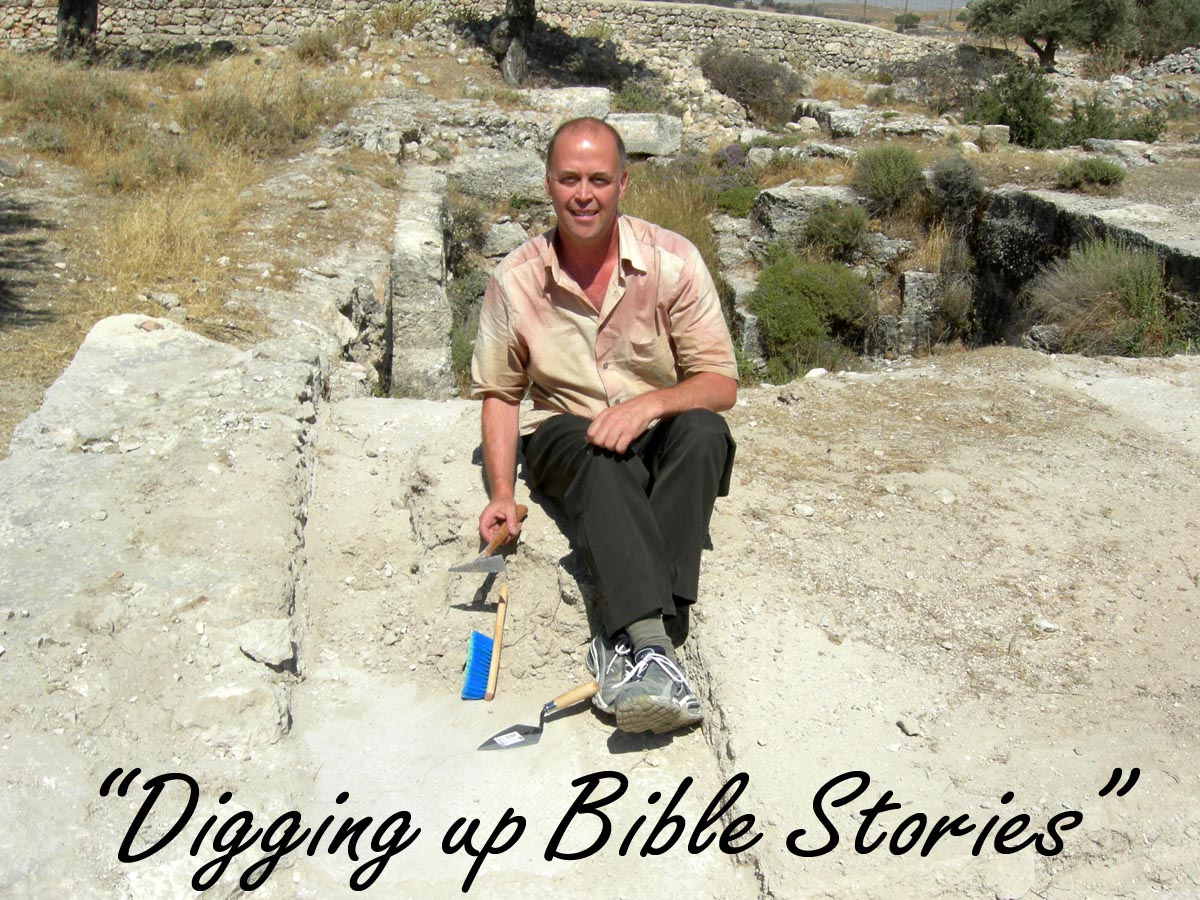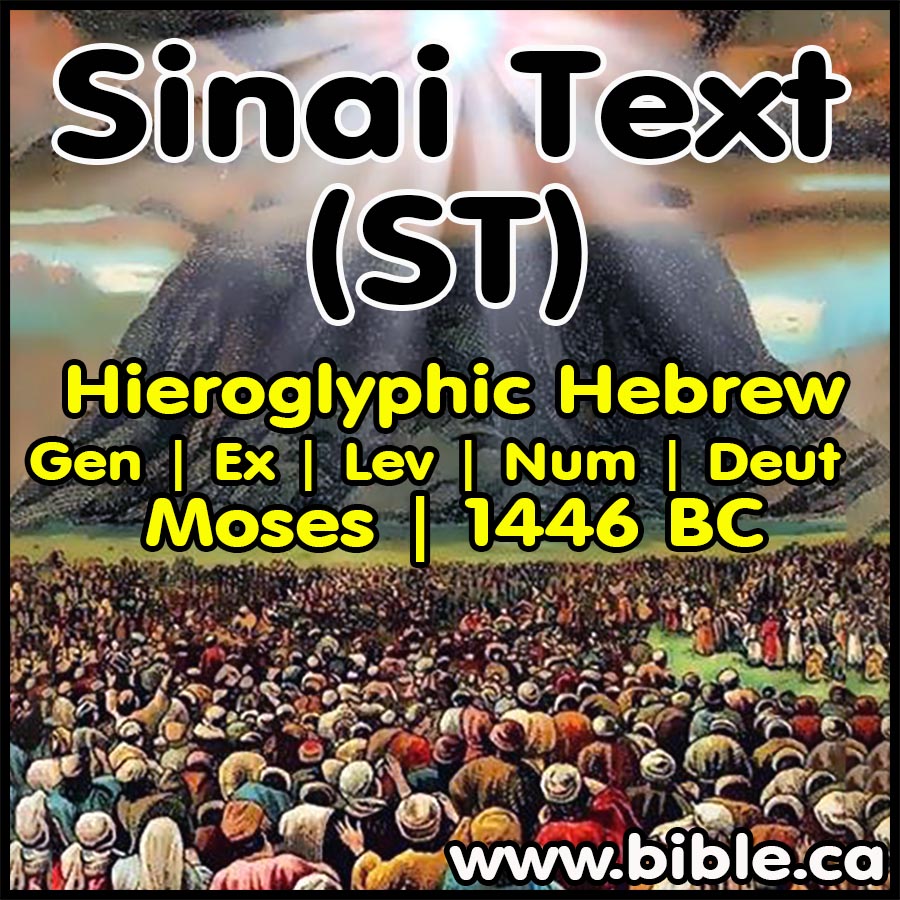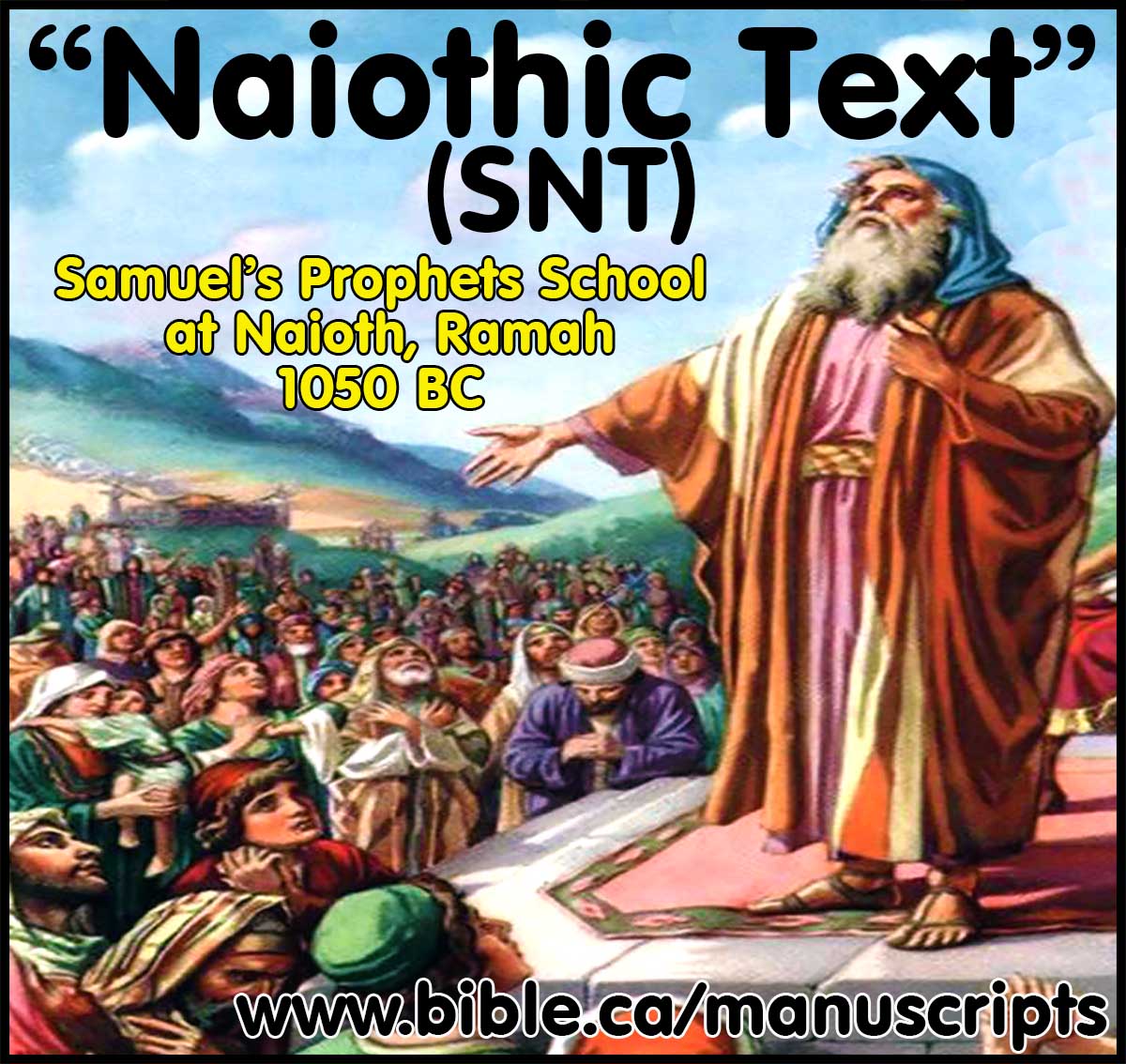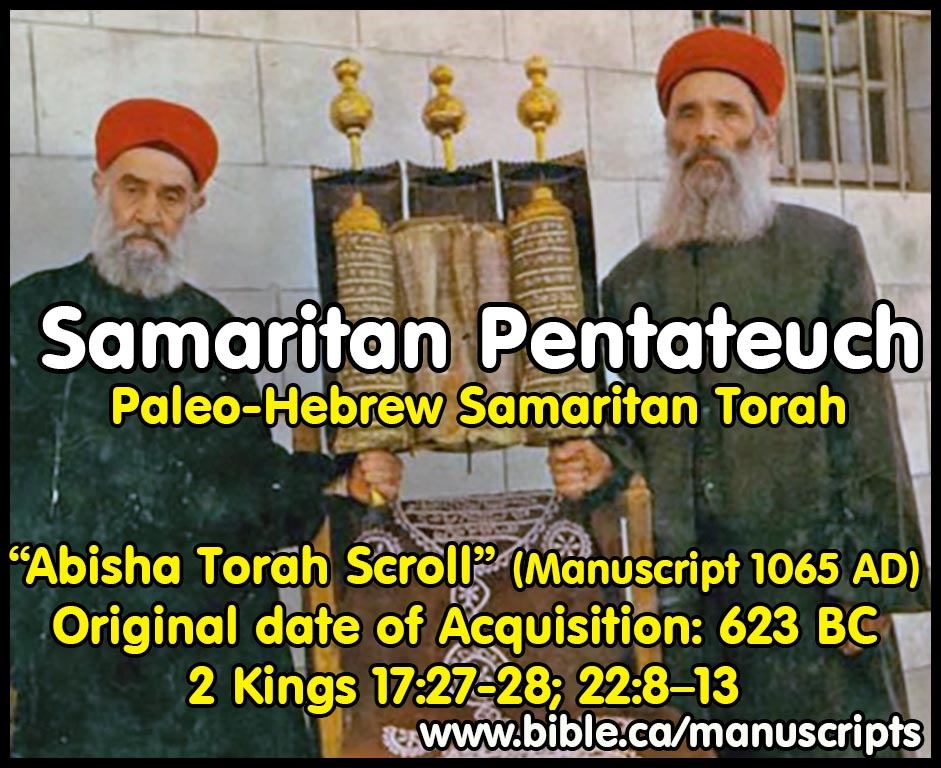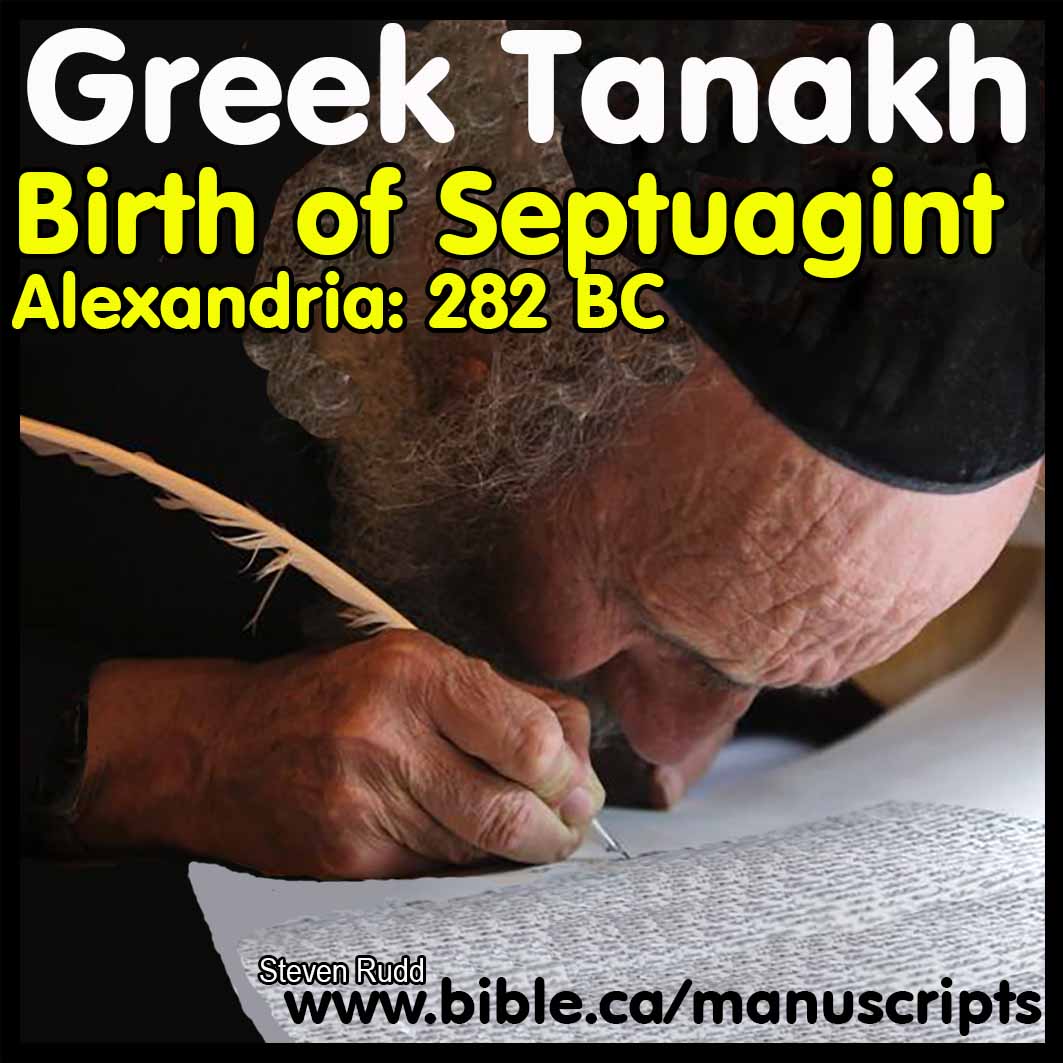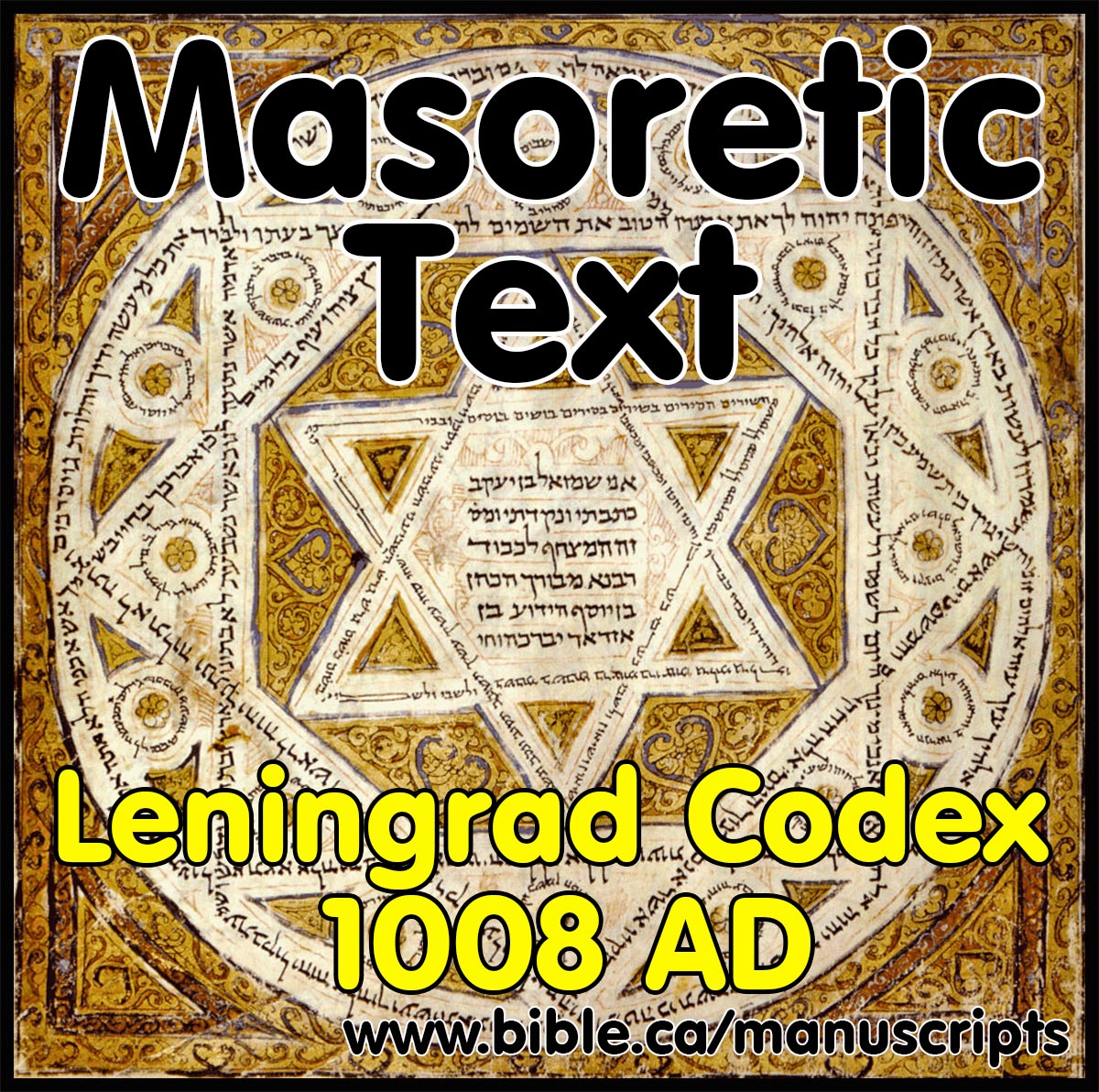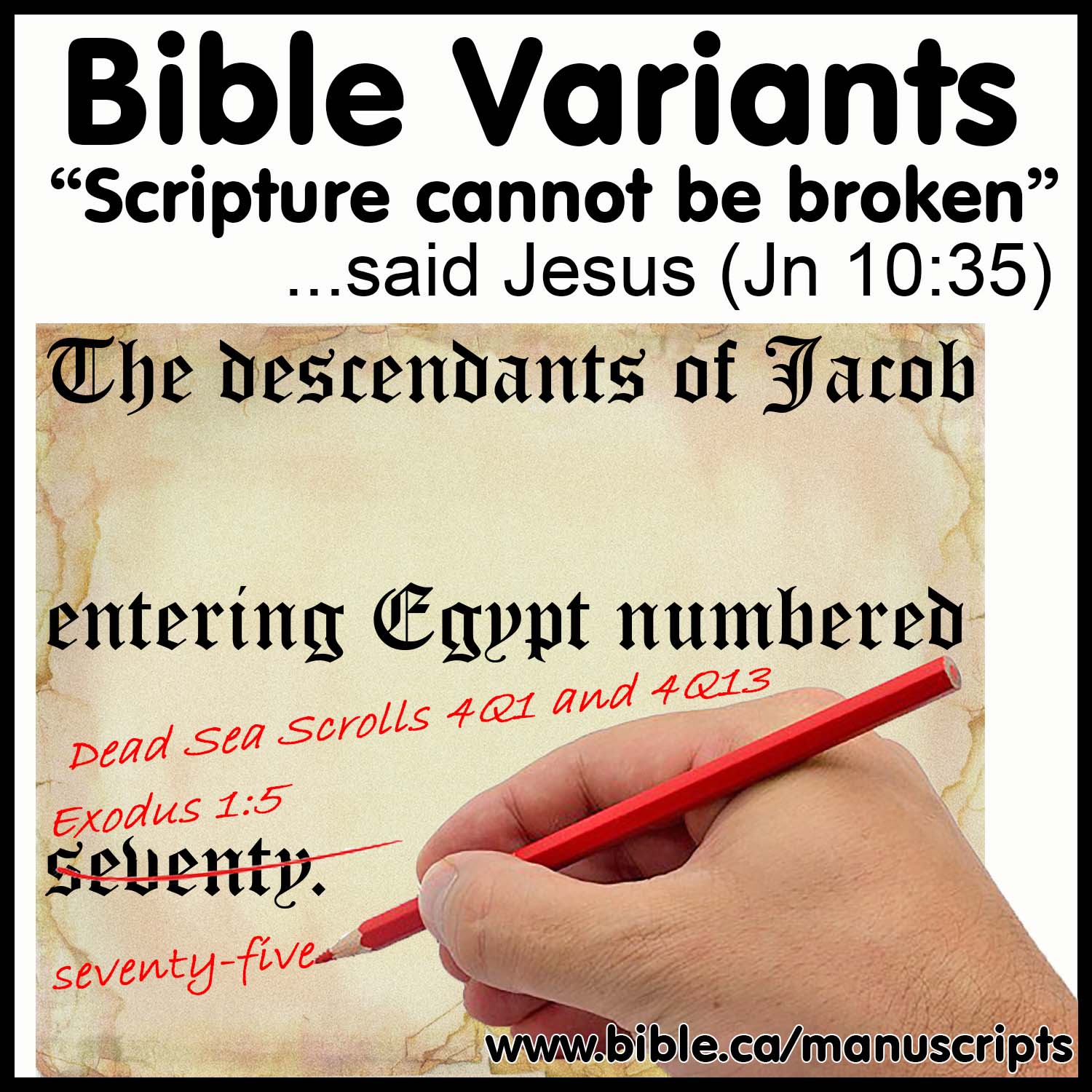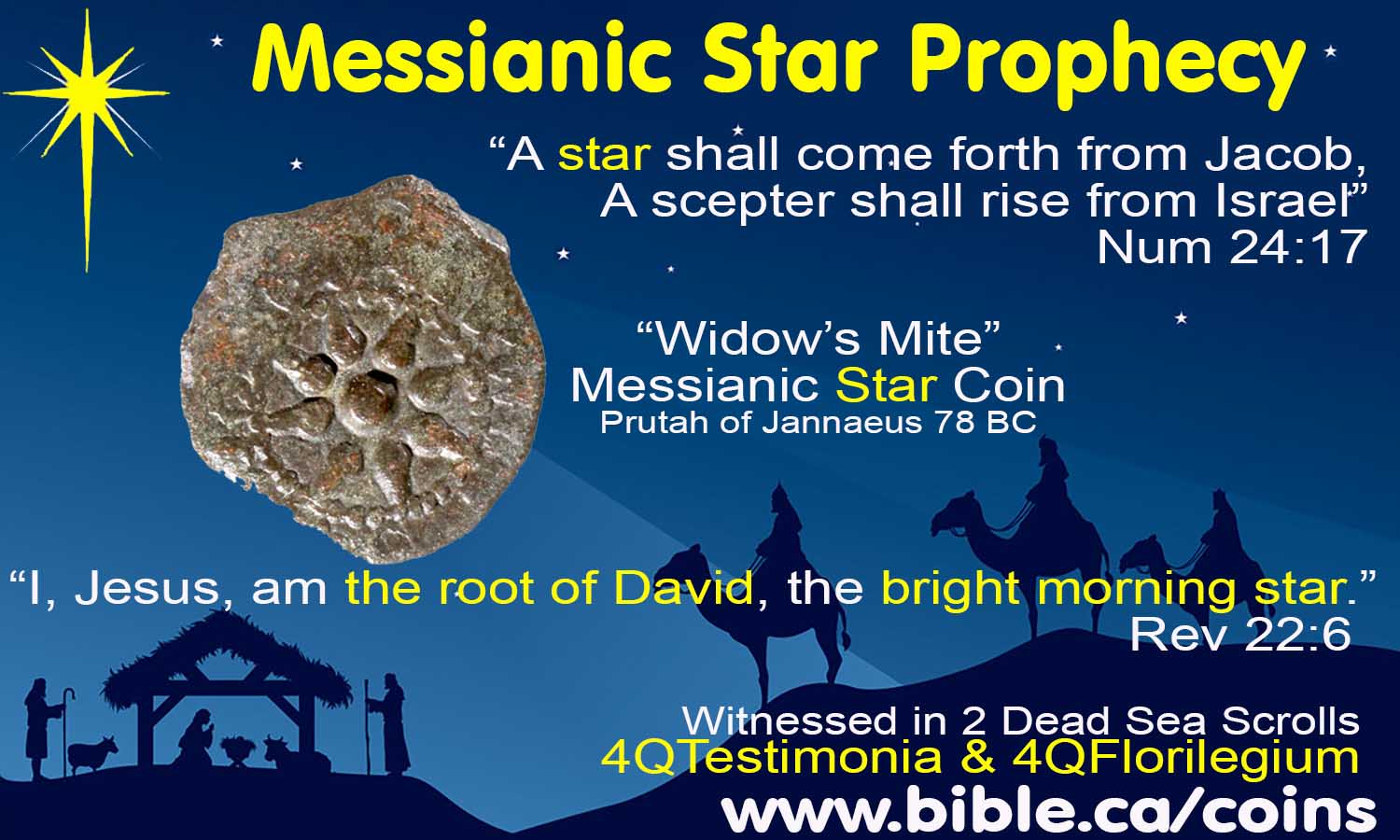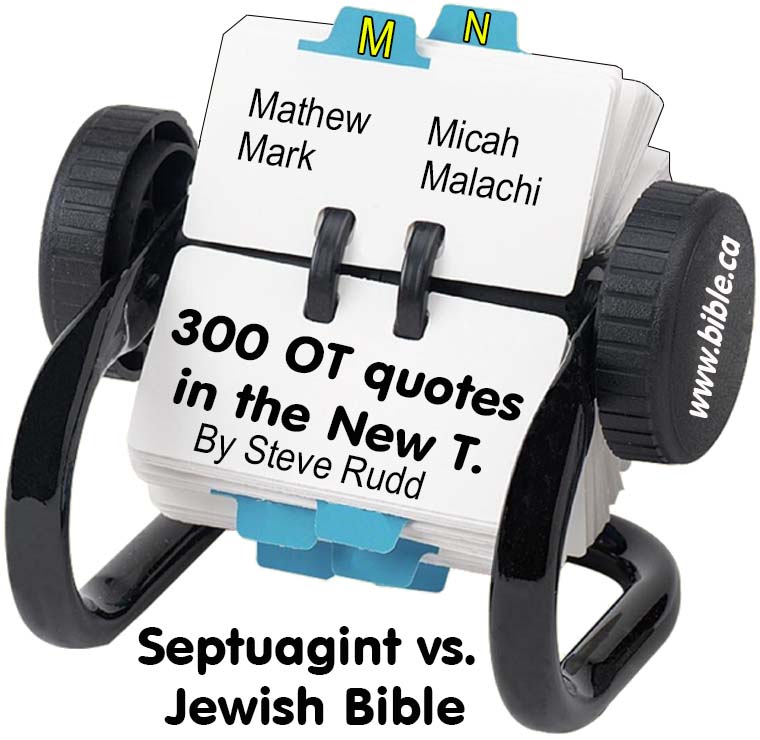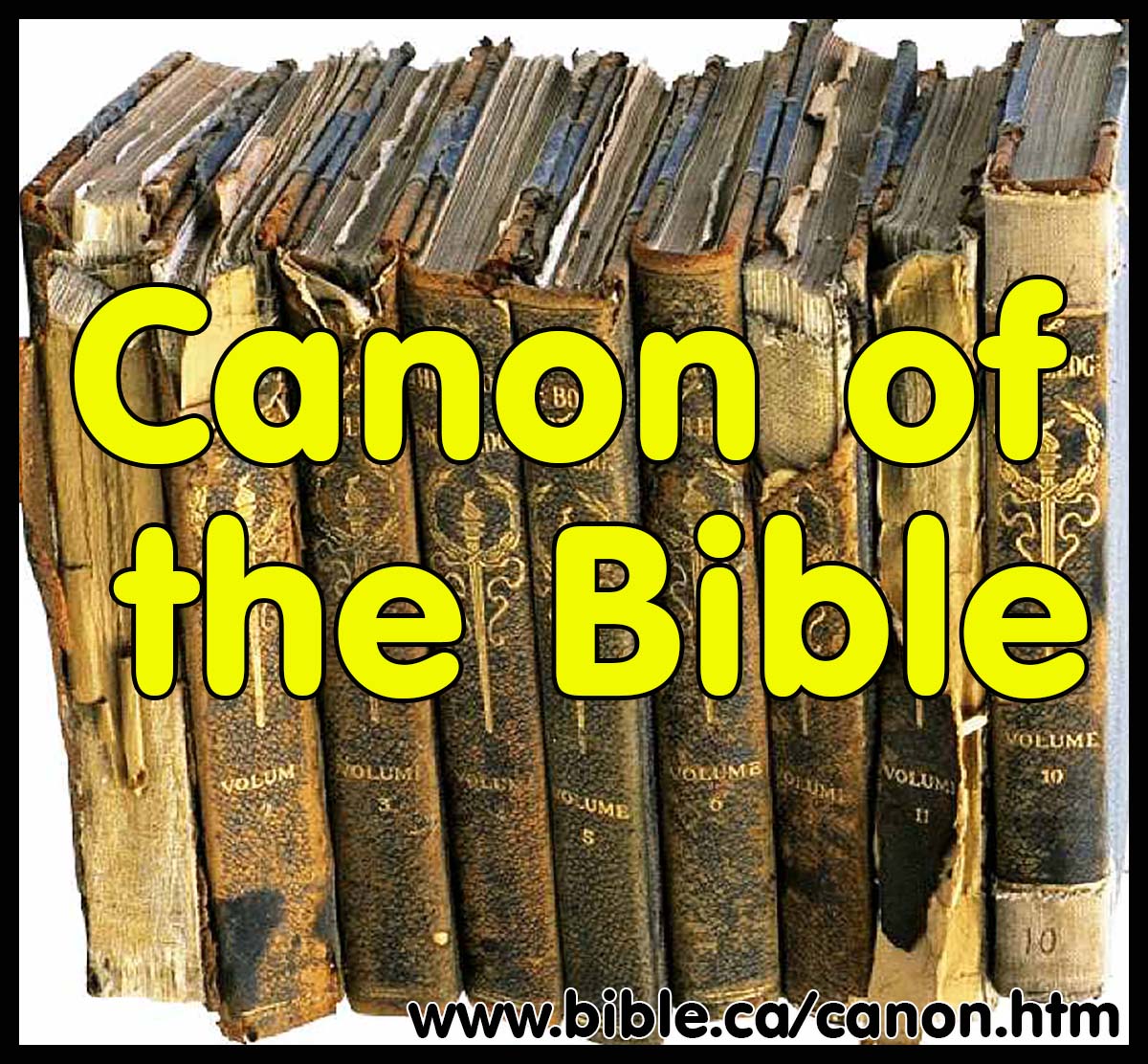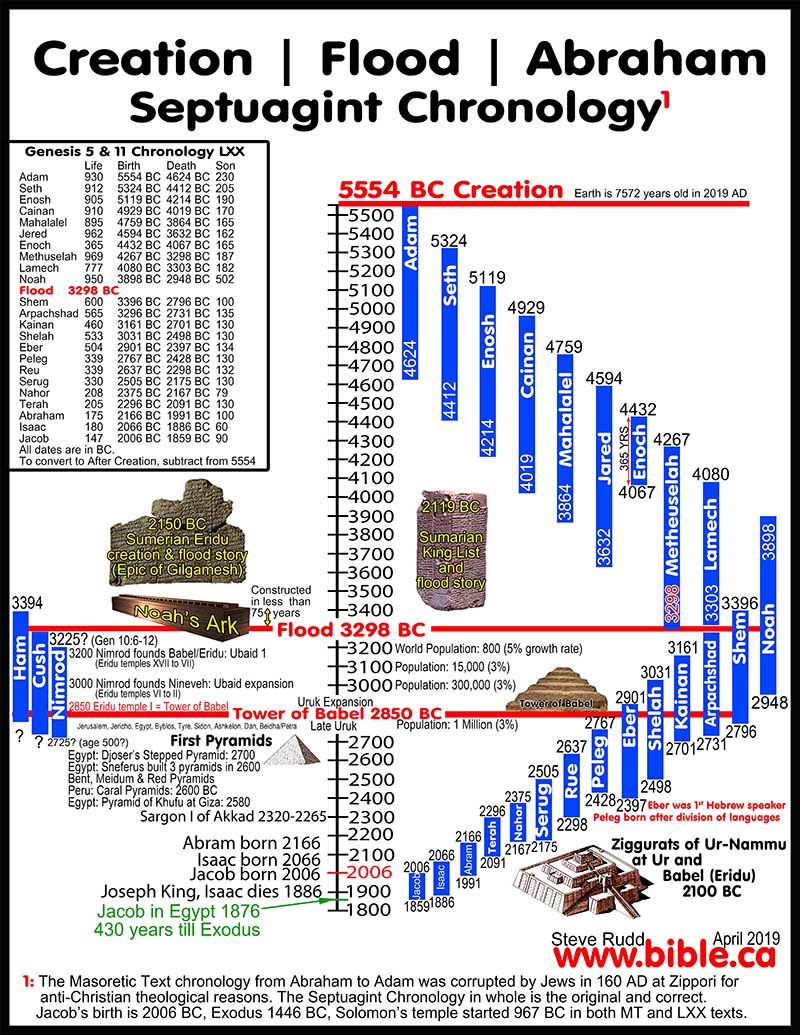Septuagint Greek Scroll of 12 minor prophets discovered at Nahal Hever: 50 BC
|
Proves the Old Testament Christians read today is the same that Jews Read in 50 BC. Proves the entire Tenakh was translated into Greek by Jews before Christ was born. |
|
|||||||
|
“But as for you, Ephrathah (ie. Bethlehem) |
|
|||||||
|
|
|
|
||||||
|
|
|
|||||||
|
|
|
|
||||||
|
Digging up Bible stories! Dating to 50 BC, this is a Greek (Septuagint) translation of the 12 minor prophets by Jews before Christ was born. This proves that the Entire Old Testament (Tanakh) was translated into Greek before the Christian Era. The text reads essentially the same as the modern text we use (Masoretic) proving the Bible has not been lost, altered or corrupted over time. YHWH is written in Mosaic Hebrew as the name of God. What you read in the book you find in the ground! |
|
|||||||
|
|
||||||||
|
|
|
|||||||
The Greek Septuagint Twelve Minor Prophets scroll (2100 years old)
1. The Greek minor prophets scroll was discovered in 1952 AD is one of the most important archeological finds ever.
a. Dodekapropheton is the Greek name for the 12 prophets as a collection.
b. It is a scroll of the entire 12 minor prophets even though much of the text is destroyed over time.
c. It shows the Bible we hold today is the same as it was before the time of Christ.
d. It proves the entire Old Testament was translated by Jews into Greek before the time of Christ.
2. The Greek minor prophets scroll dates to about 50 BC:
a. “Dating Conclusion: Both hands give the impression of belonging to the late Ptolemaic or early Roman period. Some features favour an earlier rather than a later date; no feature recommends a later rather than an earlier date.” (Greek Minor Prophets Scroll from Nahal Hever, Emanuel Tov, p25, 1990 AD)
b. Late Ptolemaic is 100-30 BC and Early Roman begins at 30 BC.
c. So Emanuel Tov, a Jewish Scholar living in Israel dates the Greek scroll to before the Birth of Christ and favours the “early date” ie. Before the Roman Era.
3. There are two caves where scrolls were found: Cave 8 “Cave of Horrors” and Cave 5-6 “Cave of Letters”
4. The Greek minor prophets scroll was discovered at cave 8 in the Nahal Hever which is located about 5 km south of En Gedi
a. Nahal (river) Hever (Hebron = friend) means “river of the friend”. The town of Hebron is due west.
b. During the Bar Kochba rebellion of 135 AD, also known as the “Second Jewish War with Rome”, the rebel Zealot had moved from Qumran, Gamla and Kh. El Maqatir to Masada and the two caves high in the hills of the Nahal Hever.
c. Cave 8 is known as the “Cave of Horrors” (Ma'arat Ha'Eimim) because 40 skeletons were found here, the remains of those seeking refuge during the Bar Kokhba Revolt. Archaeologists found three ostraca, which had been placed on the skeletons, inscribed with the names of the deceased.
d. The Romans killed the rebel Jews by smoke inhalation by setting fires at the entrance.
e. In 1952 AD skeletons of Men, women and children were excavated and reburied in the inner cave area.
f. The scroll of the 12 prophets represented a high value possession to these Jews in 135 AD, being 200 years old at the time.
g. Fragments of Jewish prayers were found in Aramaic.
5. In the “Cave of Letters” (cave 5-6) the following was found letters that date from 94-132 AD and included three collections:
a. A leather waterskin containing 15 letters (in Hebrew, Aramaic and Greek), most of which were sent by Shim'on Bar Kohkba (Shim'on b. Kosiba), the leader of the Bar Kohkba revolt.
b. A wrapped package stored inside a leather purse, containing 35 personal financial records, belonging to a woman named Babatha.
c. Five contracts belonging to Eleazar ben Shmuel, a farmer from Ein Gedi.
d. Four languages were used on the manuscripts: Greek, Hebrew, Nabatean, Aramaic
e. Of special note is that all the scripture manuscripts were in Aramaic also known as “Square Hebrew”. This is a different language and Mosaic Hebrew and modern Hebrew. Remember, in the first century Hebrew was almost extinct being used only by the Jerusalem temple elites.
f. Three other special documents were found in the Cave of Letters (cave 5-6):
i. Marriage Contract (5/6Hev37) A woman named Babata who was married and divorced/widowed twice had a marriage contract in her possession that was found in cave 5-6. It was written by husband which said, "If I [Babata's husband] die before you, you will live in my house and receive maintenance from it and from my possessions.". (5/6Hev37, Babata marriage contract, 135 AD)
ii. Sale Contract (5/6Hev47)
iii. Redemption of a Writ of Seizure (5/6Hev36)
I. The Greek 12 minor prophets scroll of the Septuagint
1. The Greek scripture scroll (cave 8) is the longest scroll ever found in Israel at 32 feet long and are currently housed in the Rockefeller Museum in Jerusalem.
a. Two different men wrote the entire scroll. We know this by graphology of textual styles that point to two different “hands” through handwriting analysis.
b. Printed on vellum (animal skin) with carbon ink.
c. Many skins were joined to create a scroll 10 meters long and 35 cm high.
2. The document is in Greek expect for Mosaic Hebrew (Paleo-Hebrew) where they wrote the name of God YHWH in the extinct Hebrew alphabet.
a. Other documents found at the same time would use four stars **** as an early “nomina sacra” substitution.
b. This substitution of Mosaic Hebrew for Greek in the name of God is probably the very beginning point of “nomina sacra”.
c. Nomina sacra developed into the Christian era and became almost ridiculous because they would create substitutional abbreviations for other “sacred” things including: God, Father, Son, Holy Spirit, Saviour, Cross, Christ etc.
d. While Christians eventually abandoned the practice of nomina sacra altogether, the Jews continue the practice by writing the word God in English as G-D where a dash is substituted for the letter O.
e. Of course the ultimate substitution was provided by the Holy Spirit himself in the 27 books of the New Testament that consistently substitute KURIOS (Greek for “Lord”) for YHWH in all Old Testament quotations in the New Testament.
f. Jehovah’s Witnesses, in their standard delusional ignorant bliss, will point to YHWH written in Mosaic Hebrew as proof that their New World Translation (NWT) is superior to all other Bibles because they “RESTORED” the name of God with Jehovah. Since a Jw is forbidden to read non-Watchtower religious materials on the internet, their knowledge is no greater than what the Watchtower tells them. To illustrate their unscholarly delusions, almost no JW even knows that the letter “J” does not exist in Greek, Hebrew. Worse still, not even English, which was derived directly from Hebrew, had a letter “J” before about 1650 AD. The 1611 AD KJV for example, does not have contain a single “J”. They spelled Jesus’ name as IESUS instead. So the NWT very modern substitution of JEHOVAH for the original autograph KURIOS in the Greek New Testament is beyond bizarre. There are no known Hebrew copies of Matthew, only rumours. And if these rumors were true, it was probably a translation from the original Greek Matthew into Hebrew. Of course 100% of Greek new testament manuscripts use KURIOS (LORD) and NEVER use YHWH. So it was the Holy Spirit “who willed” the substitution of Kurios for YHWH throughout the New Testament. Of course none of the truthful information ever phases a JW because they blindly follow the Watchtower Magazine when it contradicts the Bible. Jesus said, “leave them alone, they are blind guides”.
3. The 12 minor prophets are all accounted for but extant fragments exist only for Jonah, Micah, Nahum, Habakkuk, Zephaniah, and Zechariah. Here are the actual sections of text that have survived and can be read today. The rest is lost due to damage and decay over 2100 years.
a. Jonah 1:14-2:7; 3:2-5; 3:7-4:2; 4:5.
b. Mic 1:1-8; 2:7-8; 3:5-6; 4:3-5; 4:6-10; 5:1(2)-6(7).
c. Nah 1:13-14; 2:5-10; 2:13-14; 3:3; 3:6-17.
d. Hab 1:5-11; 1:14-2:8; 2:13-20; 3:8-15.
e. Zeph 1:1-6; 1:13-18; 2:9-10; 3:6-7.
f. Zech 1:1-4; 1:12-15; 2:2-4(1:19-21); 2:6-12(2-8); 2:16(12)-3:2; 3:4-7; 8:19-21; 8:23-9:5.
4. The Greek scroll of the 12 minor prophets has clear signs of correction of the Greek text to fit it to the Hebrew text then current.
a. It is almost identical to our modern text in our bibles today but small differences do exist.
b. The does not necessarily mean the scroll was translated from an older text that was corrected with a different new text. Most of the differences can be explained by the original translators trying to convey the meaning from Hebrew into Greek. Just like our modern English Bibles differ widely in specific words used and word order, in the end they all say basically the identical thing.
c. What is most interesting, is that the text sometimes agrees with the both the LXX and Masoretic, while in other cases differs from them both, while in other cases agrees with the LXX over the Masoretic and vice versa.
II. Micah (735 BC) from the Nahal Hever 12 Minor prophet scroll
(Click on image for ultra-high resolution)
1. Actual texts that survived and can be read in the scroll of Micah are: Mic 1:1-8; 2:7-8; 3:5-6; 4:3-5; 4:6-10; 5:1(2)-6(7).
2. "But as for you, Bethlehem Ephrathah, Too little to be among the clans of Judah, From you One will go forth for Me to be ruler in Israel. His goings forth are from long ago, From the days of eternity.”" (Micah 5:2)
3. What is interesting is that the word Bethlehem is not used in the Greek translation although it is in both the LXX of 350 AD and the Masoretic text of 1000 AD.
a. “Ephrathah” was understood to be equal to “Bethlehem”.
b. "So Rachel died and was buried on the way to Ephrath (that is, Bethlehem)." (Genesis 35:19)
c. This is also seen from the “Hebrew parallelism” in the book of Ruth who was David’s grandmother who lived with Boaz in Bethlehem: "All the people who were in the court, and the elders, said, “We are witnesses. May the LORD make the woman who is coming into your home like Rachel and Leah, both of whom built the house of Israel; and may you achieve wealth in Ephrathah and become famous in Bethlehem." (Ruth 4:11)
d. “The LXX translation of this verse represents MT quite accurately, except for the more ample phrase “house of Ephratha.” The quotation of this text in the New Testament (Matt 2:6) lacks the latter phrase. In its place it reads “land of Judah.” In this respect the reading in 8ḤevXIIgr is noteworthy. It has oiko [s——e] fratha, like LXX, but lacks “Bethlehem.”” (Micah 5:1, AYBC, 2008 AD)
4. The messianic connection between the child born in Micah 5:2 “His activity is from Eternity” and Isa 9:6 “Eternal Father” and Isa 7:14 “call His name God with US” are a trinity of powerful confirmations that Jesus is incarnate creator God:
a. "For a child will be born to us, a son will be given to us; And the government will rest on His shoulders; And His name will be called Wonderful Counselor, Mighty God, Eternal Father, Prince of Peace." (Isaiah 9:6)
b. "“Therefore the Lord Himself will give you a sign: Behold, a virgin will be with child and bear a son, and she will call His name Immanuel." (Isaiah 7:14)
5. Jehovah’s Witnesses struggle with Micah 5:2 because they view him as a creature. If the Holy Spirit wanted to say Jesus was a creature with a beginning, He would have personally chosen to use any of the words that literally mean create like: “In the beginning God created [1254 bara]" Gen 1:1. "Let us make [6213 asah] man in our own image" Gen 1:26. "And God created [1254 bara] man in His own image" Gen 1:27. "Let the earth bring forth [3318 yatsa']” Gen 1:24. This is powerful evidence against any notion that Micah 5:2 is teaching Jesus is a creature. But the irrefutable truth, is that the very word "yalad" Jehovah's Witnesses WISH TO GOD, was used in Micah 5:2 IS USED in Micah 5:3! (3205 "yalad" in the next verse!) If God wanted to say Jesus was a creature, He skipped over they key word and surely picked an obscure word, when several very clear and direct words were available. Even worse for Jehovah's Witnesses is the fact that [3318 yatsa'] "Let the earth bring forth [3318 yatsa']" used in Gen 1:24 , was used in Micah 5:2, but instead of referring to the "origin/creation of Jesus in ages past" the word is applied to the incarnation, where Jesus had pre-existence! This is devastating to Jw’s but powerful confirmation that Jesus is neither angel or creature, but Eternal uncreated God. For more details see Micah 5:2.
III. Zephaniah (622 BC) and Habakkuk (606 BC) from the Nahal Hever 12 Minor prophet scroll
(Click on image for ultra-high resolution)
1. Actual texts that survived and can be read in the scroll of Habakkuk are: Hab 1:5-11; 1:14-2:8; 2:13-20; 3:8-15.
a. "“Look among the nations! Observe! Be astonished! Wonder! Because I am doing something in your days— You would not believe if you were told. “For behold, I am raising up the Chaldeans, That fierce and impetuous people Who march throughout the earth To seize dwelling places which are not theirs. “They are dreaded and feared; Their justice and authority originate with themselves. “Their horses are swifter than leopards And keener than wolves in the evening. Their horsemen come galloping, Their horsemen come from afar; They fly like an eagle swooping down to devour. “All of them come for violence. Their horde of faces moves forward. They collect captives like sand. “They mock at kings And rulers are a laughing matter to them. They laugh at every fortress And heap up rubble to capture it. “Then they will sweep through like the wind and pass on. But they will be held guilty, They whose strength is their god.”" (Habakkuk 1:5–11)
b. "Why have You made men like the fish of the sea, Like creeping things without a ruler over them? The Chaldeans bring all of them up with a hook, Drag them away with their net, And gather them together in their fishing net. Therefore they rejoice and are glad. Therefore they offer a sacrifice to their net and burn incense to their fishing net; Because through these things their catch is large, And their food is plentiful. Will they therefore empty their net And continually slay nations without sparing? I will stand on my guard post And station myself on the rampart; And I will keep watch to see what He will speak to me, And how I may reply when I am reproved. Then the LORD answered me and said, “Record the vision And inscribe it on tablets, That the one who reads it may run. “For the vision is yet for the appointed time; It hastens toward the goal and it will not fail. Though it tarries, wait for it; For it will certainly come, it will not delay. “Behold, as for the proud one, His soul is not right within him; But the righteous will live by his faith. “Furthermore, wine betrays the haughty man, So that he does not stay at home. He enlarges his appetite like Sheol, And he is like death, never satisfied. He also gathers to himself all nations And collects to himself all peoples. “Will not all of these take up a taunt-song against him, Even mockery and insinuations against him And say, ‘Woe to him who increases what is not his— For how long— And makes himself rich with loans?’ “Will not your creditors rise up suddenly, And those who collect from you awaken? Indeed, you will become plunder for them. “Because you have looted many nations, All the remainder of the peoples will loot you— Because of human bloodshed and violence done to the land, To the town and all its inhabitants." (Habakkuk 1:14–2:8)
c. "“Is it not indeed from the LORD of hosts That peoples toil for fire, And nations grow weary for nothing? “For the earth will be filled With the knowledge of the glory of the LORD, As the waters cover the sea. “Woe to you who make your neighbors drink, Who mix in your venom even to make them drunk So as to look on their nakedness! “You will be filled with disgrace rather than honor. Now you yourself drink and expose your own nakedness. The cup in the LORD’S right hand will come around to you, And utter disgrace will come upon your glory. “For the violence done to Lebanon will overwhelm you, And the devastation of its beasts by which you terrified them, Because of human bloodshed and violence done to the land, To the town and all its inhabitants. “What profit is the idol when its maker has carved it, Or an image, a teacher of falsehood? For its maker trusts in his own handiwork When he fashions speechless idols. “Woe to him who says to a piece of wood, ‘Awake!’ To a mute stone, ‘Arise!’ And that is your teacher? Behold, it is overlaid with gold and silver, And there is no breath at all inside it. “But the LORD is in His holy temple. Let all the earth be silent before Him.”" (Habakkuk 2:13–20)
d. "Did the LORD rage against the rivers, Or was Your anger against the rivers, Or was Your wrath against the sea, That You rode on Your horses, On Your chariots of salvation? Your bow was made bare, The rods of chastisement were sworn. Selah. You cleaved the earth with rivers. The mountains saw You and quaked; The downpour of waters swept by. The deep uttered forth its voice, It lifted high its hands. Sun and moon stood in their places; They went away at the light of Your arrows, At the radiance of Your gleaming spear. In indignation You marched through the earth; In anger You trampled the nations. You went forth for the salvation of Your people, For the salvation of Your anointed. You struck the head of the house of the evil To lay him open from thigh to neck. Selah. You pierced with his own spears The head of his throngs. They stormed in to scatter us; Their exultation was like those Who devour the oppressed in secret. You trampled on the sea with Your horses, On the surge of many waters." (Habakkuk 3:8–15)
2. Actual texts that survived and can be read in the scroll of Zephaniah are: Zeph 1:1-6; 1:13-18; 2:9-10; 3:6-7.
a. "The word of the LORD which came to Zephaniah son of Cushi, son of Gedaliah, son of Amariah, son of Hezekiah, in the days of Josiah son of Amon, king of Judah: “I will completely remove all things From the face of the earth,” declares the LORD. “I will remove man and beast; I will remove the birds of the sky And the fish of the sea, And the ruins along with the wicked; And I will cut off man from the face of the earth,” declares the LORD. “So I will stretch out My hand against Judah And against all the inhabitants of Jerusalem. And I will cut off the remnant of Baal from this place, And the names of the idolatrous priests along with the priests. “And those who bow down on the housetops to the host of heaven, And those who bow down and swear to the LORD and yet swear by Milcom, And those who have turned back from following the LORD, And those who have not sought the LORD or inquired of Him.”" (Zephaniah 1:1–6)
b. "“Moreover, their wealth will become plunder And their houses desolate; Yes, they will build houses but not inhabit them, And plant vineyards but not drink their wine.” Near is the great day of the LORD, Near and coming very quickly; Listen, the day of the LORD! In it the warrior cries out bitterly. A day of wrath is that day, A day of trouble and distress, A day of destruction and desolation, A day of darkness and gloom, A day of clouds and thick darkness, A day of trumpet and battle cry Against the fortified cities And the high corner towers. I will bring distress on men So that they will walk like the blind, Because they have sinned against the LORD; And their blood will be poured out like dust And their flesh like dung. Neither their silver nor their gold Will be able to deliver them On the day of the LORD’S wrath; And all the earth will be devoured In the fire of His jealousy, For He will make a complete end, Indeed a terrifying one, Of all the inhabitants of the earth." (Zephaniah 1:13–18)
c. "“Therefore, as I live,” declares the LORD of hosts, The God of Israel, “Surely Moab will be like Sodom And the sons of Ammon like Gomorrah— A place possessed by nettles and salt pits, And a perpetual desolation. The remnant of My people will plunder them And the remainder of My nation will inherit them.” This they will have in return for their pride, because they have taunted and become arrogant against the people of the LORD of hosts." (Zephaniah 2:9–10)
d. "“I have cut off nations; Their corner towers are in ruins. I have made their streets desolate, With no one passing by; Their cities are laid waste, Without a man, without an inhabitant. “I said, ‘Surely you will revere Me, Accept instruction.’ So her dwelling will not be cut off According to all that I have appointed concerning her. But they were eager to corrupt all their deeds." (Zephaniah 3:6–7)
3. Key passages for which the Greek text survived over 2000 years are: Hab 2:4; Hab 2:19-20; Zeph 1:4; Zeph 1:14-15
a. "“Behold, as for the proud one, His soul is not right within him; But the righteous will live by his faith." (Habakkuk 2:4)
b. "“Woe to him who says to a piece of wood, ‘Awake!’ To a mute stone, ‘Arise!’ And that is your teacher? Behold, it is overlaid with gold and silver, And there is no breath at all inside it. “But the LORD is in His holy temple. Let all the earth be silent before Him.”" (Habakkuk 2:19–20)
c. "“So I will stretch out My hand against Judah And against all the inhabitants of Jerusalem. And I will cut off the remnant of Baal from this place, And the names of the idolatrous priests along with the priests." (Zephaniah 1:4)
d. "Near is the great day of the LORD, Near and coming very quickly; Listen, the day of the LORD! In it the warrior cries out bitterly. A day of wrath is that day, A day of trouble and distress, A day of destruction and desolation, A day of darkness and gloom, A day of clouds and thick darkness," (Zephaniah 1:14–15)
III. Zechariah (520 BC) from the Nahal Hever 12 Minor prophet scroll
(Click on image for ultra-high resolution)
1. Actual texts that survived and can be read in the scroll of Zachariah are: Zech 1:1-4; 1:12-15; 2:2-4(1:19-21); 2:6-12(2-8); 2:16(12)-3:2; 3:4-7; 8:19-21; 8:23-9:5.
a. "In the eighth month of the second year of Darius, the word of the LORD came to Zechariah the prophet, the son of Berechiah, the son of Iddo saying, “The LORD was very angry with your fathers. “Therefore say to them, ‘Thus says the LORD of hosts, “Return to Me,” declares the LORD of hosts, “that I may return to you,” says the LORD of hosts. “Do not be like your fathers, to whom the former prophets proclaimed, saying, ‘Thus says the LORD of hosts, “Return now from your evil ways and from your evil deeds.” ’ But they did not listen or give heed to Me,” declares the LORD." (Zechariah 1:1–4)
b. "Then the angel of the LORD said, “O LORD of hosts, how long will You have no compassion for Jerusalem and the cities of Judah, with which You have been indignant these seventy years?” The LORD answered the angel who was speaking with me with gracious words, comforting words. So the angel who was speaking with me said to me, “Proclaim, saying, ‘Thus says the LORD of hosts, “I am exceedingly jealous for Jerusalem and Zion. “But I am very angry with the nations who are at ease; for while I was only a little angry, they furthered the disaster.”" (Zechariah 1:12–15)
c. "So I said to the angel who was speaking with me, “What are these?” And he answered me, “These are the horns which have scattered Judah, Israel and Jerusalem.” Then the LORD showed me four craftsmen. I said, “What are these coming to do?” And he said, “These are the horns which have scattered Judah so that no man lifts up his head; but these craftsmen have come to terrify them, to throw down the horns of the nations who have lifted up their horns against the land of Judah in order to scatter it.”" (Zechariah 1:19–21)
d. "So I said, “Where are you going?” And he said to me, “To measure Jerusalem, to see how wide it is and how long it is.” And behold, the angel who was speaking with me was going out, and another angel was coming out to meet him, and said to him, “Run, speak to that young man, saying, ‘Jerusalem will be inhabited without walls because of the multitude of men and cattle within it. ‘For I,’ declares the LORD, ‘will be a wall of fire around her, and I will be the glory in her midst.’ ” “Ho there! Flee from the land of the north,” declares the LORD, “for I have dispersed you as the four winds of the heavens,” declares the LORD. “Ho, Zion! Escape, you who are living with the daughter of Babylon.” For thus says the LORD of hosts, “After glory He has sent Me against the nations which plunder you, for he who touches you, touches the apple of His eye." (Zechariah 2:2–8)
e. "“The LORD will possess Judah as His portion in the holy land, and will again choose Jerusalem. “Be silent, all flesh, before the LORD; for He is aroused from His holy habitation.” Then he showed me Joshua the high priest standing before the angel of the LORD, and Satan standing at his right hand to accuse him. The LORD said to Satan, “The LORD rebuke you, Satan! Indeed, the LORD who has chosen Jerusalem rebuke you! Is this not a brand plucked from the fire?”" (Zechariah 2:12–3:2)
f. "He spoke and said to those who were standing before him, saying, “Remove the filthy garments from him.” Again he said to him, “See, I have taken your iniquity away from you and will clothe you with festal robes.” Then I said, “Let them put a clean turban on his head.” So they put a clean turban on his head and clothed him with garments, while the angel of the LORD was standing by. And the angel of the LORD admonished Joshua, saying, “Thus says the LORD of hosts, ‘If you will walk in My ways and if you will perform My service, then you will also govern My house and also have charge of My courts, and I will grant you free access among these who are standing here." (Zechariah 3:4–7)
g. "“Thus says the LORD of hosts, ‘The fast of the fourth, the fast of the fifth, the fast of the seventh and the fast of the tenth months will become joy, gladness, and cheerful feasts for the house of Judah; so love truth and peace.’ “Thus says the LORD of hosts, ‘It will yet be that peoples will come, even the inhabitants of many cities. ‘The inhabitants of one will go to another, saying, “Let us go at once to entreat the favor of the LORD, and to seek the LORD of hosts; I will also go.”" (Zechariah 8:19–21)
h. "“Thus says the LORD of hosts, ‘In those days ten men from all the nations will grasp the garment of a Jew, saying, “Let us go with you, for we have heard that God is with you.” ’ ” The burden of the word of the LORD is against the land of Hadrach, with Damascus as its resting place (for the eyes of men, especially of all the tribes of Israel, are toward the LORD), And Hamath also, which borders on it; Tyre and Sidon, though they are very wise. For Tyre built herself a fortress And piled up silver like dust, And gold like the mire of the streets. Behold, the Lord will dispossess her And cast her wealth into the sea; And she will be consumed with fire. Ashkelon will see it and be afraid. Gaza too will writhe in great pain; Also Ekron, for her expectation has been confounded. Moreover, the king will perish from Gaza, And Ashkelon will not be inhabited." (Zechariah 8:23–9:5)
IV. Nahum (629-612 BC) from the Nahal Hever 12 Minor prophet scroll
(Click on image for ultra-high resolution)
1. Actual texts that survived and can be read in the scroll of Nahum are: Nah 1:13-14; 2:5-10; 2:13-14; 3:3; 3:6-17
a. "“So now, I will break his yoke bar from upon you, And I will tear off your shackles.” The LORD has issued a command concerning you: “Your name will no longer be perpetuated. I will cut off idol and image From the house of your gods. I will prepare your grave, For you are contemptible.”" (Nahum 1:13–14)
b. "The chariots race madly in the streets, They rush wildly in the squares, Their appearance is like torches, They dash to and fro like lightning flashes. He remembers his nobles; They stumble in their march, They hurry to her wall, And the mantelet is set up. The gates of the rivers are opened And the palace is dissolved. It is fixed: She is stripped, she is carried away, And her handmaids are moaning like the sound of doves, Beating on their breasts. Though Nineveh was like a pool of water throughout her days, Now they are fleeing; “Stop, stop,” But no one turns back. Plunder the silver! Plunder the gold! For there is no limit to the treasure— Wealth from every kind of desirable object." (Nahum 2:4–9)
c. "The lion tore enough for his cubs, Killed enough for his lionesses, And filled his lairs with prey And his dens with torn flesh. “Behold, I am against you,” declares the LORD of hosts. “I will burn up her chariots in smoke, a sword will devour your young lions; I will cut off your prey from the land, and no longer will the voice of your messengers be heard.”" (Nahum 2:12–13)
d. "Horsemen charging, Swords flashing, spears gleaming, Many slain, a mass of corpses, And countless dead bodies— They stumble over the dead bodies!" (Nahum 3:3)
e. "“I will throw filth on you And make you vile, And set you up as a spectacle. “And it will come about that all who see you Will shrink from you and say, ‘Nineveh is devastated! Who will grieve for her?’ Where will I seek comforters for you?” Are you better than No-amon, Which was situated by the waters of the Nile, With water surrounding her, Whose rampart was the sea, Whose wall consisted of the sea? Ethiopia was her might, And Egypt too, without limits. Put and Lubim were among her helpers. Yet she became an exile, She went into captivity; Also her small children were dashed to pieces At the head of every street; They cast lots for her honorable men, And all her great men were bound with fetters. You too will become drunk, You will be hidden. You too will search for a refuge from the enemy. All your fortifications are fig trees with ripe fruit— When shaken, they fall into the eater’s mouth. Behold, your people are women in your midst! The gates of your land are opened wide to your enemies; Fire consumes your gate bars. Draw for yourself water for the siege! Strengthen your fortifications! Go into the clay and tread the mortar! Take hold of the brick mold! There fire will consume you, The sword will cut you down; It will consume you as the locust does. Multiply yourself like the creeping locust, Multiply yourself like the swarming locust. You have increased your traders more than the stars of heaven— The creeping locust strips and flies away. Your guardsmen are like the swarming locust. Your marshals are like hordes of grasshoppers Settling in the stone walls on a cold day. The sun rises and they flee, And the place where they are is not known." (Nahum 3:6–17)
V. Jonah (759 BC) from the Nahal Hever 12 Minor prophet scroll
(Click on image for ultra-high resolution)
1. "He restored the border of Israel from the entrance of Hamath as far as the Sea of the Arabah, according to the word of the Lord, the God of Israel, which He spoke through His servant Jonah the son of Amittai, the prophet, who was of Gath-hepher." (2 Kings 14:25)
2. Here is the central messianic prophecy to the death burial and resurrection of Christ that he would be raised the third day:
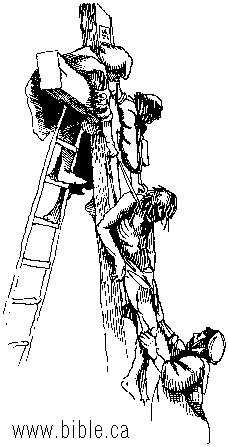
a. "And the Lord appointed a great fish to swallow Jonah, and Jonah was in the stomach of the fish three days and three nights." (Jonah 1:17)
b. "Then some of the scribes and Pharisees said to Him, “Teacher, we want to see a sign from You.” But He answered and said to them, “An evil and adulterous generation craves for a sign; and yet no sign will be given to it but the sign of Jonah the prophet; for just as JONAH WAS THREE DAYS AND THREE NIGHTS IN THE BELLY OF THE SEA MONSTER, so will the Son of Man be three days and three nights in the heart of the earth." (Matthew 12:38–40)
c. "For I delivered to you as of first importance what I also received, that Christ died for our sins according to the Scriptures, and that He was buried, and that He was raised on the third day according to the Scriptures," (1 Corinthians 15:3-4)
3. Actual texts that survived and can be read in the scroll of Nahum are: Jonah 1:14-2:7; 3:2-5; 3:7-4:2; 4:5.
a. "Then they called on the LORD and said, “We earnestly pray, O LORD, do not let us perish on account of this man’s life and do not put innocent blood on us; for You, O LORD, have done as You have pleased.” So they picked up Jonah, threw him into the sea, and the sea stopped its raging. Then the men feared the LORD greatly, and they offered a sacrifice to the LORD and made vows. And the LORD appointed a great fish to swallow Jonah, and Jonah was in the stomach of the fish three days and three nights. Then Jonah prayed to the LORD his God from the stomach of the fish, and he said, “I called out of my distress to the LORD, And He answered me. I cried for help from the depth of Sheol; You heard my voice. “For You had cast me into the deep, Into the heart of the seas, And the current engulfed me. All Your breakers and billows passed over me. “So I said, ‘I have been expelled from Your sight. Nevertheless I will look again toward Your holy temple.’ “Water encompassed me to the point of death. The great deep engulfed me, Weeds were wrapped around my head. “I descended to the roots of the mountains. The earth with its bars was around me forever, But You have brought up my life from the pit, O LORD my God. “While I was fainting away, I remembered the LORD, And my prayer came to You, Into Your holy temple." (Jonah 1:14–2:7)
b. “Arise, go to Nineveh the great city and proclaim to it the proclamation which I am going to tell you.” So Jonah arose and went to Nineveh according to the word of the LORD. Now Nineveh was an exceedingly great city, a three days’ walk. Then Jonah began to go through the city one day’s walk; and he cried out and said, “Yet forty days and Nineveh will be overthrown.” Then the people of Nineveh believed in God; and they called a fast and put on sackcloth from the greatest to the least of them." (Jonah 3:2–5)
c. "He issued a proclamation and it said, “In Nineveh by the decree of the king and his nobles: Do not let man, beast, herd, or flock taste a thing. Do not let them eat or drink water. “But both man and beast must be covered with sackcloth; and let men call on God earnestly that each may turn from his wicked way and from the violence which is in his hands. “Who knows, God may turn and relent and withdraw His burning anger so that we will not perish.” When God saw their deeds, that they turned from their wicked way, then God relented concerning the calamity which He had declared He would bring upon them. And He did not do it. But it greatly displeased Jonah and he became angry. He prayed to the LORD and said, “Please LORD, was not this what I said while I was still in my own country? Therefore in order to forestall this I fled to Tarshish, for I knew that You are a gracious and compassionate God, slow to anger and abundant in lovingkindness, and one who relents concerning calamity." (Jonah 3:7–4:2)
d. "Then Jonah went out from the city and sat east of it. There he made a shelter for himself and sat under it in the shade until he could see what would happen in the city." (Jonah 4:5)
VI. What Scholars say about the Greek 12 minor prophets scroll:
- The other important group of Greek texts comes from a cave lying on the southern slope of Naḥal Ḥever, a few kilometres south of En-Gedi. They are important fragments of a parchment scroll, which Barthélemy presented in a pioneering article to the academic world in 1953. Ten years later he published a transcription together with a study of its implications for the history of the LXX, possibly the most stimulating monograph of recent decades in the field of the Greek Bible. (cf. B. Lifshitz, “The Greek Documents from the Cave of Horror”, IEJ 12 (1962), 201–207) As late as 1962, B. Lifshitz published other fragments from the same cave which belonged to the same scroll of the Minor Prophets. And finally in 1990, the official edition came out with all the fragments published previously plus other additional unidentified fragments, photographs, a palaeographic study and a reconstruction of the text based on detailed analysis of the translation techniques, the spelling and the condition of the preserved sections. (cf. E. Tov, with the collaboration of R. A. Kraft, and a contribution by P. J. Parsons, The Greek Minor Prophets Scroll from Naḥal Ḥever (8HevXIIgr): The Seiyâl Collection. DJD VIII, Oxford 1990) In the palaeographic study of these documents, P. J. Parsons opted for dating them towards the end of the 1st century bce. (The Septuagint in Context: Introduction to the Greek Version of the Bible, Marcos, N. Fernández, p72, 2000 AD)
2. "When we come closer to the synagogue environment, we find texts that were corrected according to the proto-rabbinic Hebrew text used in rabbinic circles, both BCE and CE. A major source for this assumption is the Greek Minor Prophets scroll from Nahal Hever dated paleographically to the end of the first century BCE. This Greek scroll was revised according to the proto-rabbinic Hebrew text, together with other parts of the Greek Bible, and all of these together are named the kaige-Th revision. This development implies that there were central forces in the Jewish world assuring that the text that had been made central in its original, Hebrew/Aramaic shape would be central also in its Greek shape. The fact that the Greek Minor Prophets scroll was found among the remains of the followers of Bar Kochba, linked to the Jerusalem religious circles, is not without importance. It probably implies that this Greek text had the imprimatur of the rabbinic circles. In this regard, it should also be mentioned that this scroll, together with other early revisional manuscripts of the LXX, represented the name of God not with [Greek: kurios = Lord] but with paleo-Hebrew characters [YHWH]. The find of the Minor Prophets scroll in Naha' Hever probably implies that some of the followers of Bar Kochba read the Greek Scriptures in this revised version, and this may also have applied to other Greek-speaking communities in Israel." (Hebrew Bible, Greek Bible and Qumran, Emanuel Tov, p186, 2008 AD)
- "The translation of the Hebrew Book of the Twelve into the Greek language was part of the largest translation project of ancient times, the so-called Septuagint. After the Torah was translated, the Prophetic Books followed, among them, presumably at an early stage, the Book of the Twelve. For the sake of clarity of names, one should designate the Greek version of the Twelve by its Greek name, Dodekapropheton. As in other cases the translator used a Hebrew Vorlage for this translation that was very close to, but certainly not identical with, the Masoretic text type. In addition, his copy contained some misspellings (e.g., the interchange of some letters) and very few additions. This Vorlage was translated as literally as possible. The Vorlage certainly was different from the original Jewish lxx, but the Vorlage is lost completely and can only be reconstructed. An interesting find was a Greek scroll from Naḥal Ḥever (for the edited scroll, see Barthélemy; Tov). This certainly is not a Christian manuscript, as the name of the God of Israel is written in paleo-Hebrew letters. But how exactly its relation to the original lxx version can be described is still open to discussion. Most influential was the hypothesis by D. Barthélemy: the scroll represents a text type that was secondarily adjusted to the proto-Masoretic Hebrew text of its time. Finally, the Christian communities appropriated the lxx and adopted it in their Greek OT. This stage of the textual development is well attested by comparably well-preserved copies of the text (for an exhaustive description of the manuscript situation, see Ziegler, 7–119)." (Dictionary of the Old Testament: Prophets, p807, 2012 AD)
- "Furthermore, there are manuscript witnesses that come from the Jews and are earlier than Christianity, the most surprising of which is the Twelve Prophets scroll from Naḥal Ḥever, which exhibits clear signs of correction of the Greek text to fit it to the Hebrew text then current. Accordingly, the aim of conforming more to the Hebrew text in these early revisions of the LXX which later would lead to the calque-translation of Aquila, was earlier than Jewish-Christian polemic. (The Septuagint in Context: Introduction to the Greek Version of the Bible, Marcos, N. Fernández, p109, 2000 AD)
- "At Nahal Hever fragments of a Psalms scroll and fragments of Genesis and Numbers were discovered. A Greek Minor Prophets scroll was found at Nahal Hever as well. This is significant because the Greek scroll is very similar to the rabbinic Bible. Although the Jews came to reject the LXX, an ancient Greek translation of the Hebrew Bible that the Christians adopted, they still found a Greek translation necessary." (Baker Illustrated Bible Dictionary, Dead Sea Scrolls, p414, 2013 AD)
- From the fragments of the Twelve Prophets discovered in Naḥal Ḥever he succeeded in identifying a recension of the LXX that brings the original Greek text close to the Hebrew text at that time and puts into practice the exegetical techniques of Palestinian rabbis. Barthélemy calls this recension “R” or καίγε, and finds traces of it in various books of the LXX into which it had penetrated in an uneven fashion at one of the stages of the manuscript transmission. (The Septuagint in Context: Introduction to the Greek Version of the Bible, Marcos, N. Fernández, p119, 2000 AD)
- "Naḥal Ḥever Greek Scroll of the Minor Prophets (8ḤevXIIgr). In 1952 and 1961 fragments of a Greek scroll originally containing the twelve Minor Prophets were discovered at Naḥal Ḥever, in the vicinity of the Dead Sea. These fragments include portions of Jonah, Micah, Nahum, Habakkuk, Zephaniah, and Zechariah.260 Unfortunately, no portion of Haggai has survived. The scroll probably dates to the middle of the first century B.C. Its importance derives partly from the fact that it antedates Origen’s text-critical activity in the third century A.D. Based on space considerations the editors are “relatively confident” that the Book of Haggai originally appeared in the Naḥal Ḥever scroll between Zephaniah and Zechariah, as it does in traditional arrangements of the Minor Prophets. This scroll thus provides an important early witness to the condition of the text for those biblical passages for which it is extant. That the Haggai portion of 8ḤevXIIgr has not been preserved is a great loss to the textual study of the Book of Haggai." (New American Commentary, Haggai, p95, 2004 AD)
- "The Naḥal Ḥever Greek manuscript of the Twelve Prophets originally contained a complete Greek version of the book of the Twelve Prophets. The order of books extant in the manuscript indicates that it employed the same order of books as the MT. It was apparently among the possessions of the forty refugees who hid in the “Cave of Horror.” A Roman military camp was located on a cliff above their position, which apparently served as the base for the soldiers besieging the Jews trapped in the cave. The group buried those who succumbed during the course of the Roman siege, and they burned many of their possessions. They apparently chose to die rather than surrender. The Naḥal Ḥever manuscript was originally about 9.64 to 10.07 m. long, making it the longest manuscript found in the Judean wilderness. The height of the leather was 35.2 cm. for hand A (see below), but data for hand B is lacking. The original would have contained some fifty-five columns of text, of which twenty-five or twenty-six are extant. The manuscript was written by two hands: hand A was originally responsible for thirty-seven columns, presumably beginning with Hosea and covering the now extant portions of the books of Jonah, Micah, Nahum, Habakkuk, Zephaniah, and Zech 1:1–8:18*. Hand B was responsible for eighteen columns, covering Zech 8:18*–Malachi. The extant fragments include text for Jonah 1:14–2:7*; 3:2–5*; 3:7–4:2*; 4:5*; Mic 1:1–8*; 2:7–8*; 3:5–6*; 4:3–5*; 4:6–10*; 5:1*(2*)-6*(7*); Nah 1:13–14*; 2:5–10*; 2:13–14*; 3:3*; 3:6–17*; Hab 1:5–11*; 1:14–2:8*; 2:13–20*; 3:8–15*; Zeph 1:1–6*; 1:13–18*; 2:9–10*; 3:6–7*; Zech 1:1–4*; 1:12–15*; 2:2–4*(1:19–21*); 2:6–12*(2–8*); 2:16*(12*)—3:2*; 3:4–7*; 8:19–21*; 8:23–9:5*. The columns produced by hand A generally contain forty-two lines, and those produced by hand B contain thirty-three lines. There are six blank lines prior to the book of Micah (cf. the three lines stipulated for the books of the Twelve in b. B. Batra 13b). The scroll employs a system of pĕtûḥôt and sĕtûmôt analogous to those of the masoretic system, although none appears for the book of Zephaniah. There are spaces in the middle of some verses where MT places the accent athnach (see Mic 1:5*; 5:4*; Hab 1:15*; 2:3*; Zeph 3:7*; Zech 3:4*). The Tetragrammaton appears in Paleo-Hebrew for both hands A and B. The practice indicates special treatment of the divine name. The script employed by hand A dates to the late first century bce, and that employed by hand B dates to the late first century bce or perhaps the early first century ce. Overall, the Greek appears to be a literal translation of a Hebrew text that corresponds closely to the later MT. The Vorlage for this manuscript would therefore be a proto-MT. A number of variations appear in the text, including minor changes in the definite article, lamed plus infinitive, construct words, pronominal suffixes, articles before proper nouns, the rendition of the direct object marker, verb tenses, and other stylistic features. A full listing of variations, including those pertaining to the text of Zephaniah, appears in Tov’s edition of 8HevXIIgr. In all cases but one, the changes that appear in 8HevXIIgr may be explained not as a variation in the Hebrew Vorlage of the Greek text, but as the result of the Greek translator’s attempt to provide a literal and stylistically coherent Greek translation." (Hermeneia, Zephania, p26, 2003 AD)
VII. The entire Hebrew Old Testament was translated into Greek by 150 BC:
- Scholarly consensus is almost unanimous that the entire Old Testament was translated into Greek by 130 BC:
- "It is generally agreed that the Pentateuch or Torah was translated from its Hebrew original into Greek during the reign of Ptolemy II Philadelphus (283–246 b.c.), possibly around 280, according to reliable patristic testimony. The books in the Prophets and Writings were translated later, probably all of them by about 130 b.c. as suggested by the Greek Prologue to Ben Sira." (The Septuagint and the Text of the Old Testament, P. J. Gentry, Bulletin for Biblical Research, Vol. 16, p 193, 2006 AD)
- "Old Greek and later Greek versions. Old Greek or Septuagint refers to a translation of the Hebrew Scriptures into Greek. The Pentateuch was translated early in the time of Ptolemy II Philadelphus (285-240 BC) in Alexandria, Egypt. The evidence of the Prologue to Ben Sira suggests that almost all the remaining books were translated by 130 BC. The name septuaginta, or "the Seventy," is adapted from propaganda that the Torah was translated by seventy-two scholars from Palestine (Aristeas)." (The Text of the Old Testament, Peter J. Gentry, Journal Of The Evangelical Theological Society, 52/1, p24, March 2009)
- "The most securely dated portion of the LXX is the Pentateuch or Torah (including Genesis, Exodus, Leviticus, Numbers, and Deuteronomy), which was translated into Greek during the early to mid third century b.c. This dating is well attested by the mid to late-second century b.c. Letter of Aristeas, which describes how the translation was undertaken in Alexandria (Egypt) during the reign of King Ptolemy II Philadelphus (285–246 b.c.) and also by several other second- and third-century b.c. texts that reference the Greek Pentateuch. The dating of the other books is less certain but the scholarly consensus is that the LXX was completed by the end of the first century b.c., although it has been argued that Baruch and 3–4 Maccabees were written in the first century a.d. and incorporated into the LXX shortly thereafter.17 The prologue to the book of Sirach (or Ecclesiasticus), which was written in the late second century b.c. by the grandson of Jesus Ben Sirach, implies that in his time there were already Greek translations for “the law itself, and the prophets, and the rest of the books,” and so it seems that the LXX was largely completed by this early date. The LXX is, thus, very much a product of the Hellenistic age. It is possible, of course, that the codices of the fourth and fifth centuries a.d. incorporate some post-Hellenistic modifications affecting the gemstones named, but at present there is no reason to think this happened." (Old Testament Gemstones: A Philological, Geological, and Archaeological Assessment of the Septuagint, J. A. Harrell, Bulletin for Biblical Research, 21:1–4, p145, 2011 AD)
- "Date: According to the generally accepted explanation of the testimony of the Epistle of Aristeas, the Torah translation was carried out in Egypt in the beginning of the third century BCE. This assumption is compatible with the early date of several Greek papyrus and leather fragments of the Torah from Qumran and Egypt, some of which date from the middle of the 3rd century until the 1st century BCE. The remaining Scripture books were translated at different times. Some evidence for their dates is external, e.g. quotations from Ǿ in ancient sources, and some internal, e.g. reflections of historical situations or events found in the translation. The post-Pentateuchal books were translated after the translation of the Torah, for most of these translations use its vocabulary, and several translations also quote from the Greek Torah. Since the Prophets and several of the Hagiographa were known in their Greek version to the grandson of Ben Sira at the end of the 2nd century BCE, we may infer that most of them were translated in the beginning of that century or somewhat earlier. There is only limited explicit evidence concerning the dates of individual books: Chronicles is quoted by Eupolemos in the middle of the 2nd century BCE, and Job by Pseudo-Aristeas in the beginning of the 1st century BCE. Swete*, 25-6. The translation of Isaiah contains allusions to historical situations and events that point to the years 170-150 BCE" (Textual Criticism of the Hebrew Bible, Emanuel Tov, p131, 2012 AD)
- "Most scholars, while rejecting many of the details in the Letter of Aristeas as legendary, would agree that the Pentateuch was translated in Egypt around 250 b.c. Manuscripts that date to within one hundred years of the original translation are now extant. It is generally conceded that the rest of the Old Testament was translated into Greek by 100 b.c. at the latest. However, there is some debate as to whether these books were also translated in Egypt. Because of the work of scholars such as Albright who have shown strong Egyptian influences in the Hebrew underlying the Septuagint of the Pentateuch, it has sometimes been assumed that all the Old Testament was translated in Egypt. Bickerman has pointed to the fact that most manuscripts of the Book of Esther contain a colophon which states that the book was translated in Jerusalem. Both Tov and Barthélemy have argued for the Palestinian translation of some other books. At this time, however, not enough data is available to draw any definite conclusions about this matter. (The Transmission-History of the Septuagint. W. W. Combs, Bibliotheca Sacra, 146, p262, 1989 AD)
- Jewish fiction writer, Rabbi Tovia Singer boldly teaches that none of the Old Testament books, except the five books of Moses, we translated by Christians (not Jews) into Greek until after 100 AD:
- The Greek prophets scroll documented in this paper is irrefutable proof he is wrong.
- Tovia Singer is a Rabbi who devotes much energy to trashing Christianity as a corrupt pagan religion known as an "anti-Christian missionary". Messianic prophecy found in the book of Isaiah is a huge problem for him, especially Isa 7:14 where the Septuagint uses the word "virgin". This is devastating Tovia Singer so he fabricated an historic lie that Isaiah did not exist until after Christians translated it after 100 AD and INSERTED the word virgin to support the narrative of Matthew.
- Tovia Singer, being a Jew, would be well advised that his fiction that a Greek Isaiah did not exist before the birth of Christ makes him as bad as "Madman Ahmadinejad" who "denies the holocaust, while preparing for the next", as Netanyahu said in his UN speech. The archeological and textual evidence that the entire old testament was translated into Greek long before Christ was born is as irrefutable and factual as the Holocaust of 135 AD under Hadrian and 1945 AD under Hitler.
- Here are the words of Anti-Christian missionary: Rabbi Tovia Singer. His statements sound convincing to his general audiences, but informed Christians read them in shock and disbelief in light of the 31 foot long Nahal Hever Greek minor prophets scroll translated and used by Jews in 50 BC.
- "The original Septuagint was a Greek translation of only the Torah (the five books of Moses) nothing else. Therefore the book of Isaiah was not even part of the Septuagint translated by learned Jews thousands of years ago, as [Christian] missionaries routinely claim. Rather the book of the Tanach is a part of the Prophets, the second section of Jewish scriptures, and was forged by the church many centuries later. … The first century Roman historian Josephus Flavius, similarly states that under Ptolemy Philadephius, only the Law was translated" (Let's Get Biblical, Tovia Singer, Missionaries Defends Matthew by citing the Septuagint., vol 1, p49, 2014 AD)
- "The Septuagint in our hands is not a Jewish document, but rather a Christian recension. The original Septuagint, translated some 2,200 years ago by 72 Jewish scholars, was a Greek translation of the Five Books of Moses alone, and is no longer in our hands. It therefore did not contain the Books of the Prophets or Writings of the Hebrew Bible such as Isaiah, from which you asserted Matthew quoted. The Septuagint as we have it today, which includes the Prophets and Writings as well, is a product of the Church, not the Jewish people. … Christians such as Origin and Lucian (third and fourth century C.E.) edited and shaped the Septuagint that missionaries use to advance their untenable arguments against Judaism. In essence, the present Septuagint is largely a post-second century Christian translation of the Bible, used zealously by the Church throughout its history as an indispensable apologetic instrument to defend and sustain Christological alterations of the Jewish Scriptures… Accordingly, the Jewish people never use the Septuagint in their worship or religious studies because it is recognized as a corrupt text." (Let's Get Biblical, Tovia Singer, The Virgin Birth: A Christian Defends Matthew by Insisting That the Author of the First Gospel Relied on the Septuagint When He Quoted Isaiah to Support the Virgin Birth, vol 2, p52, 2014 AD)
- Maybe Christians should start up a "Septuagint Memorial Museum" in Jerusalem to counter such Tovia Singer's lies so that "those who corrupt history will not be allowed to repeat it".
- The very first historical and archeological exhibit will be the Greek Septuagint scroll of the Twelve Minor prophets, written by Jews in 50 BC.
- The fact the scroll was found among rebel Bar Kochba Jews as late as 135 AD proves it was a trusted text among the most pious Jews of the first century.
- There is not a recognized Septuagint scholar alive who agrees with Tobia Singer’s fictions.
Conclusion:
1. The pre-Christian Era Septuagint scroll of the 12 minor prophets is one of the most important biblical manuscripts to ever be found.
a. The “8HevXIIgr” collection of fragments of Biblical texts proves the bible we read today is the same as it was before the time of Christ. (50 BC)
b. The existence of the Greek Septuagint (8HevXIIgr) proves that all the 39 books of the Old Testament (Tanakh) were fully translated by Jews before Jesus was born in 1BC. Anti-missionary, Rabbi Tovia Singer, please take note.
2. The 12 prophets Greek scroll shows us that the Canon of the Old Testament was fully established long before the time of Christ.
a. The order of the books.
b. The fact that there were only twelve minor prophets included in the collection is the same as Christians use in Church today.
3. What you read in the book, you find in the ground! Trust your bible. It is God’s infallible and inspired word that will judge every man at the return of Jesus!
4. Why not attend a Bible believing church this Lord’s Day and BRING YOUR BIBLE:
|
|
Find a Bible blueprint church in your own home town: Just
type in your address and we will find the |
|
The Septuagint LXX “Scripture Cannot Be Broken” |
|||||
|
Start Here: Master Introduction and Index |
|||||
|
Six Bible Manuscripts |
|||||
|
1446 BC Sinai Text (ST) |
1050 BC Samuel’s Text (SNT) |
623 BC Samaritan (SP) |
458 BC Ezra’s Text (XIV) |
282 BC Septuagint (LXX) |
160 AD Masoretic (MT) |
|
Research Tools |
|||||
|
Steve Rudd, November 2017 AD: Contact the author for comments, input or corrections |
|||||
By Steve Rudd: November 2017: Contact the author for comments, input or corrections.
Go to: Main Bible Manuscripts Page
